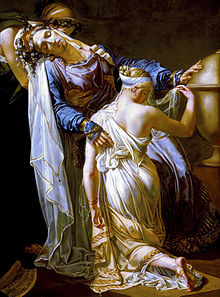Hecuba
[1] Hecuba was described by the chronicler Malalas in his account of the Chronography as "dark, good eyes, full grown, long nose, beautiful, generous, talkative, calm".
According to Suetonius in The Twelve Caesars, the emperor Tiberius pestered scholars with obscure questions about ancient mythology, with one of his favorites being "Who was Hecuba's mother?
"[12] Hecuba had 19 children, some of which included major characters of Homer's Iliad such as the warriors Hector and Paris, as well as the prophetess Cassandra.
Other named children of Hecuba by Priam are Helenus, Deiphobus, Laodice, Polyxena, Creusa, Polydorus, Polites, Antiphus, Pammon, Hipponous and Iliona.
Taking Hector's advice, she chooses a gown taken from Alexander's treasure to give as an offering to the goddess and leads the Trojan women to the temple of Athena to pray for help.
"[15] In Book 24.201–16, she is stricken with anxiety upon hearing of Priam's plan to retrieve Hector's body from Achilles' hut.
Further along in the same episode, at 24.287–98, she offers Priam the libation cup and instructs him to pray to Zeus so that he may receive a favourable omen upon setting out towards the Achaean camp.
Another legend has it that Hecuba threw herself into the sea[19] and was transformed into "a she-dog with fiery eyes" and that she was buried in a "wretched" place called Kynosema ('dog's grave'), a "landmark for sailors".

